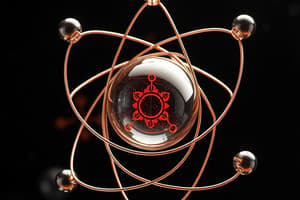Podcast
Questions and Answers
What is the primary reason for the Aufbau principle?
What is the primary reason for the Aufbau principle?
- To ensure that orbitals with the same energy level are filled simultaneously
- To predict the most stable electron configuration of an atom (correct)
- To explain the Zeeman effect in atomic spectra
- To account for the anomalous behavior of hydrogen in the periodic table
Which of the following types of chemical bonds is characterized by the delocalization of electrons?
Which of the following types of chemical bonds is characterized by the delocalization of electrons?
- Hydrogen bond
- Ionic bond
- Polar covalent bond
- π (pi) bond (correct)
What is the term for the process by which a solid changes directly to a gas without going through the liquid phase?
What is the term for the process by which a solid changes directly to a gas without going through the liquid phase?
- Melting
- Deposition
- Sublimation (correct)
- Vaporization
Which of the following statements is true about the molecular orbital (MO) theory?
Which of the following statements is true about the molecular orbital (MO) theory?
What is the name of the process by which an atom, molecule, or ion gains one or more electrons?
What is the name of the process by which an atom, molecule, or ion gains one or more electrons?
What is the underlying principle that explains the electron configuration of chromium?
What is the underlying principle that explains the electron configuration of chromium?
What is the main difference between the valence bond (VB) theory and the molecular orbital (MO) theory?
What is the main difference between the valence bond (VB) theory and the molecular orbital (MO) theory?
What is the term for the process by which a substance changes directly from a solid to a liquid without going through the gas phase?
What is the term for the process by which a substance changes directly from a solid to a liquid without going through the gas phase?
Which of the following statements is true about the MO theory?
Which of the following statements is true about the MO theory?
What is the process by which an atom gains or loses electrons to form ions?
What is the process by which an atom gains or loses electrons to form ions?
Flashcards are hidden until you start studying
Study Notes
Chemical Bonding and Electron Configuration
- The Aufbau principle is primarily driven by the need to minimize energy and maximize stability in atomic orbitals.
Delocalization of Electrons
- The type of chemical bond characterized by the delocalization of electrons is the pi (π) bond.
Phase Changes
- Sublimation is the process by which a solid changes directly to a gas without going through the liquid phase.
- Fusion is the process by which a substance changes directly from a solid to a liquid without going through the gas phase.
Molecular Orbital (MO) Theory
- The MO theory is a quantum mechanical approach that describes the distribution of electrons in a molecule.
- The MO theory states that electrons in a molecule are distributed in molecular orbitals, which are a set of wave functions that describe the probability of finding an electron within a molecule.
- The MO theory is capable of explaining the magnetic properties of molecules.
Electron Gain and Loss
- The process by which an atom, molecule, or ion gains one or more electrons is called reduction.
- The process by which an atom gains or loses electrons to form ions is called ionization.
Electron Configuration of Chromium
- The underlying principle that explains the electron configuration of chromium is the Aufbau principle and Hund's rule.
Valence Bond (VB) Theory vs Molecular Orbital (MO) Theory
- The main difference between the VB theory and the MO theory is that the VB theory focuses on the formation of localized bonds between atoms, while the MO theory focuses on the distribution of electrons in molecular orbitals.
Chemical Bonding and Electron Configuration
- The Aufbau principle is primarily driven by the need to minimize energy and maximize stability in atomic orbitals.
Delocalization of Electrons
- The type of chemical bond characterized by the delocalization of electrons is the pi (π) bond.
Phase Changes
- Sublimation is the process by which a solid changes directly to a gas without going through the liquid phase.
- Fusion is the process by which a substance changes directly from a solid to a liquid without going through the gas phase.
Molecular Orbital (MO) Theory
- The MO theory is a quantum mechanical approach that describes the distribution of electrons in a molecule.
- The MO theory states that electrons in a molecule are distributed in molecular orbitals, which are a set of wave functions that describe the probability of finding an electron within a molecule.
- The MO theory is capable of explaining the magnetic properties of molecules.
Electron Gain and Loss
- The process by which an atom, molecule, or ion gains one or more electrons is called reduction.
- The process by which an atom gains or loses electrons to form ions is called ionization.
Electron Configuration of Chromium
- The underlying principle that explains the electron configuration of chromium is the Aufbau principle and Hund's rule.
Valence Bond (VB) Theory vs Molecular Orbital (MO) Theory
- The main difference between the VB theory and the MO theory is that the VB theory focuses on the formation of localized bonds between atoms, while the MO theory focuses on the distribution of electrons in molecular orbitals.
Studying That Suits You
Use AI to generate personalized quizzes and flashcards to suit your learning preferences.



